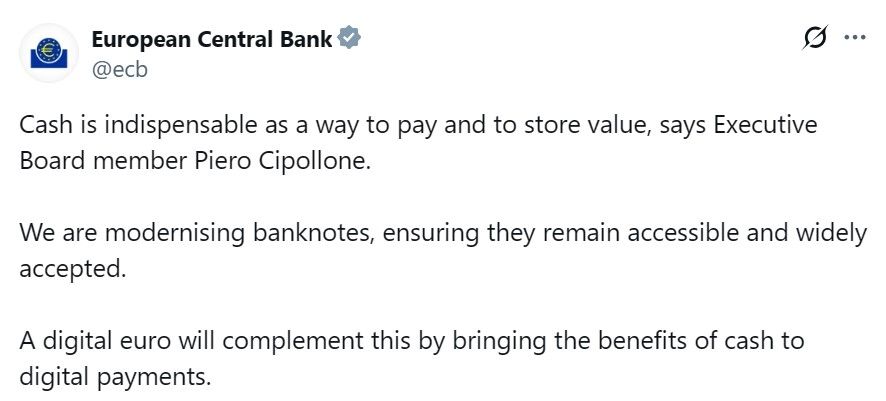💶 ECB: Cash Isn’t Dead — It’s Here to Stay (Even With the Digital Euro Coming)
-

As the world races toward digital payments, the European Central Bank is hitting pause on any talk of cash extinction.
In a blog post this week, ECB Executive Board member Piero Cipollone made one thing clear:
“A digital euro will not replace cash — it will complement it.” Why it matters:
Why it matters:The digital euro is coming, but it won’t mean goodbye to coins and notes. The ECB wants to ensure payment autonomy for Europeans, offering choices: digital and physical. Cash is still crucial in times of crisis or tech outages, Cipollone added. "Consumers will have coins, notes, and digital euros — all with legal tender status," he said.
"Consumers will have coins, notes, and digital euros — all with legal tender status," he said.
🪙 What’s the ECB Building?The digital euro is a regulated central bank digital currency (CBDC), meant to:
Compete with private stablecoins Reduce reliance on dollar-backed tokens Future-proof Europe’s payments without handing the keys to Big Tech or foreign stablecoin issuersYet ironically, an ECB study in March showed most Europeans aren’t all that excited about it. When asked how they’d spend €10,000, people barely allocated anything to the digital euro.
 Meanwhile, Stablecoins Are Surging
Meanwhile, Stablecoins Are SurgingThe ECB’s worry? Dollar-based stablecoins are growing fast and could take over Europe’s digital economy if regulation doesn’t keep up.
On that note, ECB adviser Jürgen Schaaf called for:
Stronger stablecoin regulation Euro-pegged digital alternatives And a unified European response to crypto’s riseTL;DR:
Cash isn’t going away. The ECB is building a digital euro — not to replace paper money, but to give Europeans more ways to pay.
Fiat, stablecoins, and CBDCs may soon all coexist — the question is who will control the rails. -
This statement from the ECB is quite telling — while the world is rushing toward digital currencies, the acknowledgment that "cash isn't dead" shows that they still recognize its role in financial stability, privacy, and accessibility.It’s easy to get caught in the digital hype, but physical cash still empowers the unbanked, supports offline transactions, and acts as a safeguard against system outages or surveillance overreach. A hybrid system — with both digital euro and traditional cash — might actually be the smartest path forward. Props to this post for highlighting the nuance!
 🧠
🧠
-
The ECB’s reassurance about cash staying relevant, even with the rollout of the digital euro, sends a strong message: inclusivity and choice still matter. Not everyone is ready or willing to go fully digital, especially older generations or those in rural, underbanked areas.Also, this could be a strategic way to calm public fears about monetary control and privacy under a centralized digital currency. By keeping cash alive, they’re easing the transition — not forcing it. Great post that opens up a bigger conversation about the balance between innovation and freedom.

 ️
️

















